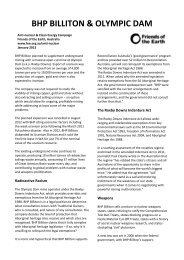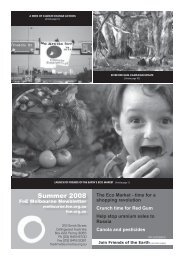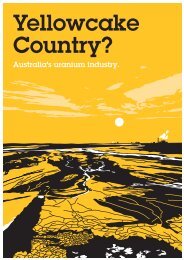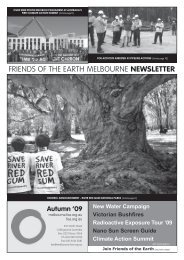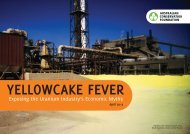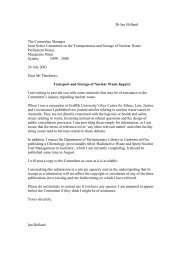Thirty Years of Creative Resistance - Friends of the Earth Australia
Thirty Years of Creative Resistance - Friends of the Earth Australia
Thirty Years of Creative Resistance - Friends of the Earth Australia
Create successful ePaper yourself
Turn your PDF publications into a flip-book with our unique Google optimized e-Paper software.
What makes <strong>the</strong>se comments sadder in<br />
hindsight is <strong>the</strong> fact that <strong>the</strong> link between<br />
<strong>the</strong> Telstra sale and environmental funding<br />
was always artificial and later revealed<br />
as a ‘cynical political fraud’ by a senior<br />
government adviser who said that <strong>the</strong> link<br />
was created by Howard’s staffers to make<br />
<strong>the</strong> sale more palatable.<br />
The political trajectory <strong>of</strong> <strong>the</strong> Coalition’s<br />
approach to <strong>the</strong> environment – that we ‘are<br />
all environmentalists now’ and just need<br />
to roll up our sleeves and get on with <strong>the</strong><br />
job <strong>of</strong> ecological restoration – included<br />
re-casting <strong>the</strong> Peak Conservation<br />
Organisation. This was reconstituted<br />
as <strong>the</strong> NECF, <strong>the</strong> National Environment<br />
Consultative Forum, with an expanded<br />
membership <strong>of</strong> corporate funded and<br />
‘non political’ organisations such as Keep<br />
<strong>Australia</strong> Beautiful and Clean Up <strong>Australia</strong>.<br />
With <strong>the</strong> election <strong>of</strong> <strong>the</strong> Howard<br />
government, environment victories and<br />
gains through ‘traditional’ methods <strong>of</strong><br />
lobbying <strong>the</strong> Federal Government became<br />
increasingly elusive. Many groups<br />
evaluated <strong>the</strong>ir campaign focus with<br />
some, for example <strong>the</strong> Wilderness Society,<br />
moving more towards investment-based<br />
activism and targeting <strong>the</strong> companies<br />
financing destruction <strong>of</strong> old growth forests.<br />
O<strong>the</strong>rs, including <strong>the</strong> ACF, expanded <strong>the</strong>ir<br />
contacts with <strong>the</strong> corporate sector, while<br />
some such as World Wildlife Foundation<br />
(WWF) and <strong>the</strong> Humane Society were<br />
able to develop useful links with <strong>the</strong> new<br />
government.<br />
This period saw many <strong>of</strong> <strong>the</strong> larger<br />
environmental NGOs increasingly<br />
isolate <strong>the</strong>mselves from broader social<br />
movements. As <strong>the</strong>y sought ‘unlikely<br />
alliances’ with non-traditional partners<br />
and closer co-operation with various<br />
corporations, subtle political shifts became<br />
apparent. This was not uniform and<br />
certainly <strong>the</strong>re were many exceptions to<br />
this trend. But it is clear that <strong>the</strong>re was a<br />
pattern <strong>of</strong> increased collaboration between<br />
Environmental NGOs and corporations<br />
towards <strong>the</strong> end <strong>of</strong> <strong>the</strong> decade, a<br />
development that raised many questions<br />
about what environmental sustainability<br />
...................................................................................................................................................................................................<br />
meant and how we might be able to<br />
achieve it.<br />
True to its political traditions, FoE was<br />
deeply suspicious <strong>of</strong> <strong>the</strong> motivations <strong>of</strong><br />
some <strong>of</strong> <strong>the</strong> companies involved and <strong>the</strong><br />
actual ecological value <strong>of</strong> many <strong>of</strong> <strong>the</strong><br />
relationships forged during this period.<br />
Both bilateral arrangements between<br />
specific environment NGOs and particular<br />
companies, and <strong>the</strong> broader use <strong>of</strong> NGOs<br />
in verifying <strong>the</strong> environmental claims<br />
<strong>of</strong> companies, were considered to be<br />
problematic.<br />
Journalist and commentator Bob Burton<br />
noted in an edition <strong>of</strong> Chain Reaction that<br />
focused on corporate engagement (#87)<br />
“ … <strong>of</strong>ten <strong>the</strong> tension between NGO’s<br />
rhetoric <strong>of</strong> accountability and transparency,<br />
and <strong>the</strong> reality <strong>of</strong> passively engaging in<br />
corporate processes led to divisive internal<br />
conflicts resulting in <strong>the</strong> costly loss <strong>of</strong> staff<br />
and volunteers. Where once, independent<br />
campaigning would create conflicts with<br />
corporations, engagement transfers <strong>the</strong><br />
conflict into and between NGOs.”<br />
More pointedly, Jim Green commented in<br />
<strong>the</strong> same edition that NGOs engaged in<br />
close collaboration with large corporations<br />
were actually “providing political cover for<br />
corporate polluters”. On a simplistic level,<br />
some in <strong>the</strong> movement could and did<br />
dismiss FoE’s concerns as being about<br />
‘old fashioned’ views <strong>of</strong> <strong>the</strong> corporate<br />
sector. However, FoE’s assessment <strong>of</strong><br />
<strong>the</strong> dynamics that surfaced around <strong>the</strong><br />
issues <strong>of</strong> corporate engagement focused<br />
on who <strong>the</strong> fundamental change agents in<br />
society are. It recognised that whilst many<br />
<strong>of</strong> those engaging had effectively decided<br />
that power rested with corporations, many<br />
o<strong>the</strong>rs, who were more cautious about<br />
engagement, saw power as ultimately<br />
resting in <strong>the</strong> hands <strong>of</strong> communities. FoE<br />
argued that primary alliances between<br />
<strong>the</strong> environment movement and ‘change<br />
agents’ needed to be firmly focussed on<br />
community-based organisations.<br />
While engagement can be seen as a<br />
pragmatic choice in a time <strong>of</strong> limited<br />
opportunity and hence just be considered<br />
FoE 30 <strong>Years</strong> 52



